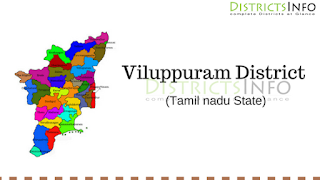Viluppuram District With Talukas: Viluppuram (also Villupuram and Vizhupuram) is one of the thirty two districts which make up
Tamil Nadu state situated on the southern tip of India. The district headquarters is located at Viluppuram. Viluppuram district came into existence on 30 September 1993 when it was created out of South Arcot district. Viluppuram is the largest district in the state. The district lies in the middle of the Tiruchirapalli to Chennai National Highways No. 45. Villupuram has the longest National
roads of any district in Tamil Nadu. It is well connected by the rail road and it is major junction.
Viluppuram District was earlier a part of South Arcot District along with Cuddalore District. It
was then divided became a separate district on 30 September 1993. Because of this, the history of Viluppuram district closely resembles that of Cuddalore. Villupuram district has 13 taluks.
Viluppuram District
According to 2011 census, Viluppuram district had a population of 3,458,873 with a sex-ratio of 987 females for every 1,000 males. The average literacy of the district was 63.48%. Viluppuram which is in the far southeast part of India, situated 160 kilometers (99 mi) south of Chennai, 160 kilometres (99 mi) north of Trichy, 177 kilometres (110 mi) east of Salem, 40 kilometres (25 mi) west of Pondicherry shares the seashore of the Bay of Bengal. The area contains metamorphic rocks
formed by pressure and heat belonging to the granite-like gneiss family. There are also three major groups of sedimentary rocks, layers of particles that settled in different geological periods. Gingee Fort is well known for its history and stone architecture. Auroville is an experimental township in Viluppuram District. Shiva temple at Thiruvamathu, popular as Valentine's Day temple. The weather in Viluppuram is generally humid and hot. It relies on the monsoon for rain during October, November and December. Summers are very hot.
Talukas in Viluppuram District
| Gingee |
Kallakurichi |
| Thirukoilur |
Ulundurpet |
| Vanur |
Villupuram |
| Sankarapuram |

